Podcast: Download (Duration: 33:14 — 30.6MB)
Get Notified Of Future Episodes Apple Podcasts | Spotify | Amazon Music | Android | Blubrry | Gaana | TuneIn | Deezer | Anghami | RSS | More
What is revenue sharing
Podcast highlights:
01:44 – What began with a book
03:46 – Just what is a revenue share deal?
04:36 – What’s good about it
06:48 – Knowing the number and getting paid
08:42 – Achieving the balance
10:18 – Missteps will happen
13:44 – Always have an agreement
15:44 – Getting the deal structure right
17:15 – “Would you give me a dime…?”
19:27 – Stacking your leverage
20:09 – Key points covered
22:07 – Hard to get versus easy to get
24:21 – Do the research
26:17 – Looking at the wins
30:20 – Some closing advice
Build your business with help from James. Choose between coaching or a revenue share deal
Transcription:
James: James Schramko here. Welcome back to SuperFastBusiness.com. This is Episode 625. Today I’m having a chat with a good friend of mine, Charley Valher. Welcome to the call.
Charley: Thanks so much, James. It’s awesome to be here.
James: We’ve had some great discussions over the last six or seven months when I met you and got to know you quite well. We’ve been working together on some business projects, and I’ve really enjoyed our discussions. I always look forward to them, and I’m sure today will be in line with that, because we’re going to be covering the topic of revenue share deals. And this is something that I’ve been particularly interested in.
And of course, as you know, I’ve been sharing some of my ideas and thoughts around it with you, as you’ve put a few of these deals together yourself. So this is somewhat of a case study exploration discussion as a lead up to what you’re going to be presenting at SuperFastBusiness Live in Sydney, in April 2019. So we should get stuck into it.
What began with a book
First off, Charley, just give us a little bit of background as to how you and I collided in this universe and what you had been doing up until then, what you were planning to do while we were working together, and what you’re doing now.
Charley: Yeah. 2018, what a year. It’s already gone, I can’t believe it. So I am a co-founder of a company called Outsourcing Angel. And that’s something I started a number of years ago with a good friend of mine, Linh Podetti.
Now, about a year ago to when we’re actually recording this podcast, I read your book, Work Less, Make More, which was a fantastic book that I really, really enjoyed. Now, upon reading that, it really kind of hit a few nerves for me and made me want to come and basically be a part of SilverCircle and learn more from you. Because I just felt like you had the right attitude towards life in a lot of ways.
Now, upon coming into SilverCircle, I was really, really big in 2018 on doing the podcast and doing the community thing, which is something I wanted to learn from you. But quickly over that time, things kind of took a very, very different turn with a series of events. And I’ll go into them now, is that basically we ended up kind of working on revenue share deals instead of the community and podcast, because that kind of naturally evolved.
So for me, it had always been a dream, like an absolute dream, to kind of like buy and sell businesses. Like, that was something I really wanted to do. And then upon the year coming out through there, the idea of revenue share deals really kind of hit that nerve for me again, and I realized this is something I wanted to be a part of.
So midway through the year, you kind of introduced me to the idea of revenue share deals. And then we made a quick kind of pivot on what I was doing. And then this has become really what my 2018 was all about, was putting together these deals and learning how to create and execute revenue share deals.
James: Yeah, it’s been such a fantastic journey. And the thing that’s remarkable is how quickly you’ve adapted to it, and embraced it. And as you and I add revenue share deals to our portfolio, we’ve got a lot of stories to swap and experience to gain.
Just what is a revenue share deal?
And I think first off, we should cover, what is a revenue share deal? I’d love to hear how you explain it. Because as you’ve already discovered, the way that you talk about a revenue share deal might be different when you and I are talking about it, or when you’re talking about it with a potential prospect who you’re considering going into business with. Let’s have a chat about the subtleties around that.
Who is the best prospect for your first revenue share deal? Click here to find out!
Charley: Yeah. Really good question there, James, because some people I’ve encountered have had a bit of a stigma around them, or they’ve copped a bad rap. And I just think it’s a bit misguided. So, you know, more commonly they’re known as revenue share deals, or royalty deals. And the way they work is that in working with someone, you would actually receive a percentage of the revenue of the company, rather than like, a profit split, or an equity portion or fee for service.
What’s good about it
Now, what I really love about revenue share deals is it’s a very clean metric. It’s a very honest metric. And I’m not sure about you, but I’ve done profit share deals in the past. And what often ends up happening is profits, are a bit of a, say, a dirty number, because someone might be running their personal expenses through their business, like their car, or travel or something like that. And it ends up coming up a bit kind of, like, uneven.
“It’s a very clean metric. It’s a very honest metric.”
And I also think that people can often manipulate their profit number based on what they’re trying to do in their life. Like, some people are very strategic about making sure they look like they’re making as little as possible for tax reasons. And I’m not for or against that. But they may have other goals where this is a way where it’s very clean and fair, because the money either hit the bank, or it didn’t, there’s no in between. It’s either pregnant or not scenario.
James: Yeah, so that raises a few issues. One would be if the business is sold. And the great thing about the way that you can put the deals together is that it will actually capture that sale event, because you can take a percentage on the sale price. And it is worth pointing out, there are no rules with this. I mean, there might be regulatory rules in certain countries, etc. But whatever deal you want to put together is up to you.
I’ve heard these tales of famous entrepreneurs going to meetings and having a lawyer type follow them around, where they’d put deals together on a piece of paper, and then they have their lawyer finalize it and turn it all into a proper agreement. But if you can be creative, and work out a deal that works for everybody, there is a fantastic opportunity to leverage into new businesses that you wouldn’t ordinarily go into.
It is also worth pointing out, it has a different level of protection, which is also a risk when you do these kind of deals, when you’re taking a percentage of revenue. It’s very easy to understand, it’s a simple metric to work out, it even can allow for refunds or adjustments, and it’s usually worked on money collected, and paid in a month or two after the event, which is all good.
You’re not trying to be a director, you’re not trying to take ownership of the company, you don’t need to be in the company’s names, you don’t have to be exposed to any loans they may have. So there’s much less risk in that regard.
Knowing the number and getting paid
The big question that comes up is, how do you know what the number is and how will you get paid? How do you address that, Charley?
Charley: That was like, my first question when I started looking at these. And I suppose I owe you a big kind of thank you for these, because I’d heard of the concept of revenue share deals before and I’m sure most people had. I actually had seen them on Shark Tank, that TV show, and I understood the concept. But it was very much when you made me aware of like, there are no rules here; like, your perception of what you think they are probably isn’t true.
And that was the big kind of like, aha moment, because, as you mentioned, like putting in the point of sale, you can structure that into a deal. Or you can adjust the percentage of the deal like we’re talking about now, how do you come up with that amount? Now, for most businesses, I kind of, when I’ve gone through the books, I try and look at a percentage between, it might be, in some cases, five percent all the way up to 15 percent, depending on what the business is, and how much revenue they’re creating at that point.
Now, you can think of an obvious example is if someone’s in an information business. OK, so they selling info products online, they’ve got a very high profit margin versus someone who, let’s say, is in ecommerce, they might have a 10 percent margin on some of their products. So a margin that, you know, a percentage that high really isn’t gonna work.
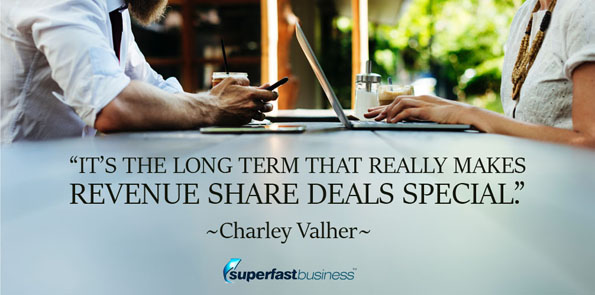 So I like to go about it in a deal-by-deal basis. I really like to dig in and look at what’s going to be fair, and really work for everyone. Because I think the worst thing that can happen, and this is like, something that I would never want to happen to me, is you get into a deal and the person you’re doing the deal with is worse off than you are. Like, the way deals work and the way things have to be is that has to work for everyone. So I really like to have a deal that can work both ways, where it’s fair and even in everyone’s eyes, and that everyone gets to win for the long term. Because I think it’s the long term that really kind of makes revenue share deals special. It’s not a short-term idea. It’s a long-term idea.
So I like to go about it in a deal-by-deal basis. I really like to dig in and look at what’s going to be fair, and really work for everyone. Because I think the worst thing that can happen, and this is like, something that I would never want to happen to me, is you get into a deal and the person you’re doing the deal with is worse off than you are. Like, the way deals work and the way things have to be is that has to work for everyone. So I really like to have a deal that can work both ways, where it’s fair and even in everyone’s eyes, and that everyone gets to win for the long term. Because I think it’s the long term that really kind of makes revenue share deals special. It’s not a short-term idea. It’s a long-term idea.
Achieving the balance
James: Yeah, these are long-term deals. I mean, ideally, when you go into a partnership with someone, you have a long-term focus. And I did learn from one of my mentors, and this is somewhat ironic, because when I tell you what it was, and what happened next, that will be funny. But he said that any deal that is too lopsided for one party won’t survive. And it’s ironic, because this guy and his business partner had the ultimate war, this battle royale of epic proportions, and one of them lost everything, and the other one got everything. And it was the one who got everything that was the one that gave me the advice.
“Any deal that is too lopsided for one party won’t survive.”
So the partnerships have to be set to balance quite well. It’s kind of like, if you wanted to do a partnership down at the park with someone on a seesaw, you have to get the balance right for it to be fun for both of them. You know, if one’s just up in the air, or the other one’s sitting on the ground, that’s not much fun. It doesn’t last long. So you got to get the balance right.
And I think approaching it with a starting document is a nice way to go about it. A starting document can outline the various components that make up the deal. But it’s also adjustable, you can adjust the dials, you can change the numbers to make it work for everybody. And as you pointed out, some businesses have different profit margins. You’re not going to get a 20 percent deal on an ecommerce business where that’s likely their entire profit. And at the same time, if you have an information product business that has an 85 percent profit margin, there’s a good chance you could get a better deal than five percent.
Missteps will happen
So the numbers I think you’re going to learn over time, what represents great deals or not, and there is certainly going to be some missteps along the way. And Charley, you already had a little misstep at one point. Do you want to talk about some of the mistakes that can happen or that you have experienced? And you definitely don’t have to reveal any details that are private or confidential. But I’m just wondering if there’s any sort of highlights you would have for someone thinking about these sort of deals?
Charley: Absolutely. How long have we got in these podcasts? This might go for a while.
James: Aw, don’t be ridiculous. I think you’ve landed very well on your feet. But you know, when you start a brand new business model, it’s like learning a new language. Anything new is going to be hard at first. I mean, that’s why currently I’m putting together training on this topic for SuperFastBusiness members. And I coach people like you on this business model.
And it’s not just a lay down misere out of the gates, you’re going to have some misfires, as I did, actually. When I started doing these sort of deals, I did them slightly differently and I made a few errors. And I’m talking about 10 years ago. I tried to get straight into this, but I didn’t have the benefit of the research and the experience that I now have. Because, just for a little bit of my backstory on this topic, I put together a bunch of different agreements, I think there was six or seven to start with, of other people who I knew do these kind of deals. And I’d heard about these deals from people like Jay Abraham, and directly from his business partner, there was this guy called Spike Humer. And he gave me the tip about percentage of revenue and capturing it upon sale. But back in the old days, I tried them and it didn’t work.
So now I’d armed myself with much better information, spent some time going through the legal work with a lawyer and invested in that. And then I started using filters to get the right deals. And over time, I’ve learned which deals work better for me, and work best for my customers.
So Charley, what was your famous mistake?
Charley: All right, I’ve got a few here. And I’ll keep the names out of it to protect people.
James: Please do.
Charley: There certainly is a learning curve with this.
James: This is not easy stuff, which is why it’s not recommended to try this yourself. OK? It’s good to get advice or help from someone who’s already been there, which is what I think is clever. You’ve done that, and I certainly got some great pointers from some people who have blazed a path in this area before. And I’ve got on the phone calls, and I’ve had the in-person meetings, I’ve traveled across to other countries to get this knowledge, and then I’ve applied them myself. So there is a steep learning curve.
Charley: Yeah, I certainly wouldn’t have even approached this topic without your help, because it is a steep learning curve. But that really made a huge difference. But I’ll go through some of the ones here.
And the first one, which you kind of hinted at from there, is the first deal I went into, I went, you know, gung ho into it without getting an agreement drawn up, without spending the time nodding out the nuts and bolts of the deal. And unfortunately, in that deal, I got taken advantage of, and someone did a runner with my IP which really hurt, because we did lift the revenue by about 30 percent. So it was working. But unfortunately, this person got greedy and decided that they didn’t need me. And I didn’t have any protection in the deal for myself. So they left with the IP. And I learned a very, very important lesson, we’ll say. That was the first one.
Always have an agreement
James: And so the big lesson there is always have an agreement. And I’m not flexible on this one. Every single one of my revenue share deals has a written agreement that spells everything out in as much clarity as possible.
 And the interesting thing here is, when you go through the agreement phase, this is when you learn the most about your partner. This is where you can have any of the potential battles you might have had in a year or two from now, you can have them before you even start. And I’ve had a couple that were pretty hairy, a bit of back and forth, and some some interesting viewpoints were flushed out by the way they interpret the agreement and the way that I was presenting the agreement. And in the end, I’ve been able to adjust them all to make them work. But I’m so glad we had that conversation in the beginning.
And the interesting thing here is, when you go through the agreement phase, this is when you learn the most about your partner. This is where you can have any of the potential battles you might have had in a year or two from now, you can have them before you even start. And I’ve had a couple that were pretty hairy, a bit of back and forth, and some some interesting viewpoints were flushed out by the way they interpret the agreement and the way that I was presenting the agreement. And in the end, I’ve been able to adjust them all to make them work. But I’m so glad we had that conversation in the beginning.
And as a side note, Charley, when you had this setback, we were able to resolve it in a fairly creative and unique way. And I’m not going to ask you what we did or how we did it, I just want to put it out there that sometimes through a little bit of a hardship, there can be a great lesson that can set you on your path for your next adventure. I’ll leave it at that in that regard.
Charley: Ooh, teaser. I might even reveal that at the event.
James: OK, do that. Talk about that at SuperFastBusiness Live, which is actually a pretty exclusive event. There’s only going to be a couple of hundred people at that event. And I’m absolutely certain anyone going to SuperFastBusiness Live, paying attention to your presentation, will have a million dollar recipe for what they can do that they probably didn’t realize they could do using the assets they already have access to. And they could probably turn business deals that were not going to fly into business deals by using a unique way of approaching it.
So I think what we did there was groundbreaking, and I’ve certainly been doing this, and I’ve given a few clues to SuperFastBusiness members. But I’d love you to reveal that – that will be a great delight.
Getting the deal structure right
What was your other mistake?
Charley: Oh, so the next mistake I made was, so we went for the wrong deal in the first thing, you know, no agreement. In the next part here, in the second deal is, I got the deal structure wrong. Like, there was a curve where what I had drawn up and what we agreed upon, this person just kind of found ways to weasel through them. And we actually had to redo an entire agreement.
So I’ll go through it really quickly here, because I think it’s important, and is that the way we were both interpreting the agreement was different. And then what we thought we’d agreed upon, we both agreed, but it was actually we’d agreed on different things without kind of nodding through it. So we had a little bit of a friction point in a deal.
The deal has come good, and it’s all good now. But what we actually had to do, and this is what I do with all my revenue share deals now, is that once we’ve got an agreement, I jump on a Zoom call, and we record it, and we go through item by item, and define what we both think this is and just really talk through the individual points so they can come together well there.
James: Yeah, well, that’s, again, the agreement is going to make sure that you have no ambiguity. That’s the goal, is to make sure that you’re coming out… When I was talking about how you even talk about these deals, that’s the very first point of barrier that you need to move past. And I think when people actually get what this means, how it actually works, I’ve found these deals are actually easier to put together than a regular coaching-type deal, or a fee-for-service or a retainer model.
“Would you give me a dime…?”
So if you’re listening to this podcast, and you currently sell either a one-time service or if you have a retainer business model, then this deal is actually a pretty low risk for your prospect, because they’re only paying you if they improve their situation. The way that I usually structure them, and the way that Charley’s structuring them, is that there is only a fee payable if you’re able to improve their income. And you just get a smaller slice of that.
The way Jay Abraham to talks about it, he says, “Hey, would you give me a dime for every dollar I help you earn in your business?” That’s the simple way to put it forward. I think the way you approach it is important. A lot of business owners may not want to give up a dime, they might think they can do it without you. And one way to address that challenge with them is to suggest to them, well, they’ve got as far as they can get by themselves. Now, if they’d like some help to take it to the next stage.
Now, it’s very important that you actually have to have the skills and the ability to help them take it to the next stage if you intend to get paid, and if you want it to work out well for you and for them. Now, Charley, in your case, you brought skills to the table, you’ve got very strong systems understanding, you have resource in terms of team, you have traffic agency background, and you have the ability to create content. So that’s something you can bring to the table.
In my case, very similar, actually. I’ve got the ability to apply my team to things, I have extensive knowledge of what works, from all the people I’ve coached, and I also have the ability to bring traffic in certain markets. There are certain fits for what I can deliver that are better than others, anything to do with online marketing. Of course, I’ve already got a ready-made audience, so I could literally plug in as if I’m a super affiliate and to grow that business.
So, what was your next one? Did you have a third one, or have we run out of mistakes?
Charley: Look, well, they’re the main mistakes and I’ll quickly kind of, it’s like, you got to make sure you get the right deal for you. You’ve got to get that deal structure right. And you got to make sure you have an agreement in place. That is just is so, so important. And they’re the kind of the big ones.
Stacking your leverage
But I’d love to kind of comment on what you said there, is like, and this is something I’ve been kind of obsessed with as I’ve gotten deeper in this, is that you want to stack your leverage. You really, really want to stack where you’re strong into these deals. And I think that makes such a huge difference. So for me, it’s like I’m very online, like a lot of VAs, a lot of digital marketing experience, like those areas are something where I do well, but it wouldn’t be a good idea for me to do a revenue share deal with like, a bricklayer, because I don’t have the experience. I’ve never grown a massive bricklaying company, I’m not going to be able to use my VAs in the Philippines to come and buy bricks. Like, it just doesn’t make sense for me to chase those types of deals. So deal selection and stacking where you can get the leverage or the audience just is so important here.
“You really, really want to stack where you’re strong.”
James: Yeah, exactly right. It’s filtering. You have to filter the deals.
Key points covered
So a couple of key points so far. It’s how you position what it is that you’re actually providing. It’s the agreement that you put in place. You have to define what each of the variables are and how they work so they’re clearly interpreted.
Then you have to document it in writing. And there will be legal fees up front in most cases, because inevitably, if you start changing your template – which firstly, the templates going to cost, I’ve spent thousands on my template – and making sure that it works in applicable law regions, and that it is something that any lawyer could pick up and understand how it’s to be interpreted. But you will usually, if you make an adjustment, you want to get it validated by a legal expert to make sure you’re not destroying the terms and conditions, which is very easy to butcher if you’re not careful.
One thing that you might want to include in your agreement, is how often you will get in touch with your partner. James talks about that in this short video.
But that’s probably the thing that’s going to scare people off this, that it’s a little bit complex, and that there are up front investments in time and energy. You have to do your due diligence, you have to have some legal help at certain points, and you’ve got to convince someone that it’s a good idea. If you can get over those obstacles, these deals are very beneficial on the other side of that, because now you’re in business with someone and you can become a beneficiary of what their business is, and you can help them grow it without having to go into that business yourself. So you can basically become like an angel investor of IP, if that’s how you want to do it.
Or if you have a very strong resource, if you are a Facebook agency, or you do supply team members, you might be able to provide your services to that business where they’re weak and make them very strong. And if you filter correctly, and this a big step, is to set your filters really well. And I think you’re going to go into that a little more, what your filters might be, at SuperFastBusiness Live, as I’m going to go through in the training in SuperFastBusiness, is setting those filters.
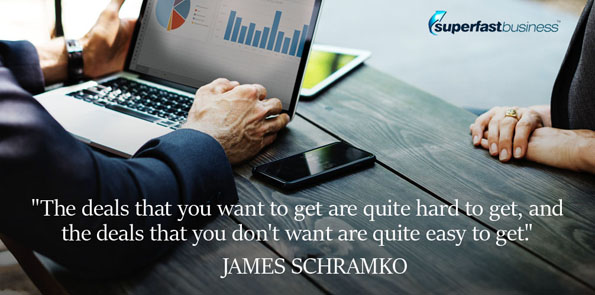 Hard to get versus easy to get
Hard to get versus easy to get
There’s one thing I have found – that the deals that you want to get are quite hard to get, and the deals that you don’t want are quite easy to get. So you have to be careful with that one. If someone’s racing to go into business with you, that can definitely be a red flag, because they’re probably over-relying on you, or hoping that you’re going to have some miracle effect. The people who are more confident in their product or service and have gotten more established momentum are generally going to be a little bit more reluctant to go into a deal like this, until you can show them how it can work for both of you. And that means adjusting the terms to make it work for everybody. And over time, as you build your portfolio, to prove that these deals have been beneficial for the other people who you’ve been in business with. And of course, just like regular business, reputation and results are everything when it comes to this.
“Reputation and results are everything.”
Charley: I actually can’t believe how true that was because you told me that. You were like, aw, the easy deals you don’t want. I’m like, who’s going to give away a revenue share deal? Getting a deal is going to be hard, James. That’s what I thought. And then I actually couldn’t believe how many people out there will pretty much give you their business. They’re like, take it!
James: Yeah. Because I mean, as you get more authority, people want to work with you. And I found that that is a filter that I’m careful about. It doesn’t mean it’s a no. It’s just like, if they’re too willing to let me take over. I’m like, what do they expect me to do for that? Why are they so under-confident in what they’ve built? So there is this fine line. But I’ve found that there’s a nice little balance.
And some deals are just too hard, and you’ll never get, and you don’t want to be in business with them. Like, for example, when a company gets far too large, or there’s too many stakeholders or too many partners, it’s just going to be hard. Like, you’re not going to do a revenue share deal with a big bank, or a massive airline company, probably, out of the gates, at least, until you become a world-renowned expert at this. And when you are, then it will will be easier to get those deals. But again, the people who are more in a negative place or more backwards are going to be more desperate. And they’ll try anything. It’s like people who go on those drug trials where they have an incurable disease, they’ll try absolutely anything because the stakes are high, and they’ve got nothing to lose.
Charley: Yeah. Due diligence is just so important on that one. I think you can’t spend enough time on due diligence before you get into working with someone. I mean, something I found really, really interesting: in the ones where the deal was like, easy to get across the line, it’s fascinating that when you really dig into someone’s numbers, or their books, or you look at the amount of hours they’re working, you’ll often find they’re like a really burnt-out person, like they’re working a ton of hours. And there’s probably some sort of revenue or profit decline. So they’re in a bit of a more defeated mindset. I think that’s so important to do the due diligence and really look at the factors of like, how this person is living, how much time they’re putting into their business, are they a workaholic, is what they’re doing actually sustainable? Because one of the reasons they might be trying to get you involved in this is because they actually want to do less, really want to back down their efforts. And it’s not always easy to kind of identify that, because that not often will come through on the numbers. But you know, due diligence just plays such an important role here.
James: Well, I’d say a lot of people who I’m working with do need to back off a bit. And it’s lucky I can help them with that. But this is a really important point, it’s what are you actually doing for your cut? And that is a big topic, one that’s too big for this podcast episode and more appropriate for a training event.
But it’s getting that balance right of what you’re promising. You definitely don’t want to make the mistake of promising X number of hours per month or something like that. It’s more to do with, are you providing knowledge? Are you providing customers? Are you providing some sort of access to a resource you have? Are you a matchmaker? So there may be a way to provide what you’re normally providing for clients on a retainer basis, but in a revenue share deal instead, or a royalty share deal.
So whatever you want to call it, it’s very important to specify or to not specify what you provide in too much detail, because this could be a little bit of a niggle down the track.
Looking at the wins
Let’s just switch gears a little bit. Let’s talk about a couple of the wins because we’ve certainly highlighted some of the difficult aspects of this.
I’m going to kick off and say, for me, I’m migrating most of my high-level coaching service across now to revenue share deals. And I made a bit of a move at the end of last year to turn the tap on. And I’m really, really happy with my new business partners and how it’s been working for me. And they certainly, as you increase your portfolio, the number of revenue share deals that you have, it definitely evens out the potential spikiness of the income. Some people might have a wipe here and there in terms of meeting the barrier or the threshold of where I start getting paid. And this can vary, this is one of the variables. And the second thing is, some of them have a fantastic month and it could go way over what the expectation is. But they do tend to balance out and considering that they’re long term deals and that there’s a provision for exit, I’m really happy.
What about you, Charley? How’s it going for you, because you’ve just been in this a short time?
Charley: Yeah, so 2018 was Year One, if you will, and we’ll call that the year of learning. Now being completely upfront is that, you know, that wasn’t the most profitable year of it. But, in getting these deals right, working at the agreements, working how to do all these things, in 2019, I expect these will actually be majority of my income. And it’s already really starting to show that.
So there’s been this amazing curve that, you know, once you’re into a deal, and you start making some gains, the upside and longevity is just fantastic. Like, really fantastic, which is awesome.
The other side of it is that one of the things I’ve elected to do now – again, under your guidance, I don’t want to take credit for this idea, it was definitely yours – is that the revenue share deals I go after, I’m trying to synchronize them so that they leverage into each other. So the more revenue share deals I go after, it actually kind of like strengthens the deals, because the deals play into each other.
So I’ll use an example, I want to be really clear on this. It’s like, let’s say you do a revenue share deal with a sneaker company, and then you do a revenue share deal with a company that sells socks – well, it just makes sense that socks and shoes go together. Like, let’s make this into something bigger. Like, let’s expedite this. And you get a lot of like, crossover advantages. So something I’m winning a lot at at the moment is that like, for example, I have a company, Outsourcing Angel, that has an audience, that has customers, and we can leverage that into these other deals. And then they grow, and then we might generate some leads, or do a JV or something like that, and the crossplay becomes where we generate a lot of value.
And this is what I love about these type of thing, is you can’t do that in a lot of cases and participate in the upside. There would be no way for me to own equity in every one of these companies. There’ll be no way for me to start all these companies. So it’s offered me this huge shortcut where it’s like, I feel like I’m just playing this really leveraged game where one idea or one crossover can just have tremendous upside that very few people could create, unless they’re one of, you know, let’s say they’re listed on the ASX or the share market or something, those guys can probably do it. But that’s been huge for me.
James: Well, it’s almost the true definition of an entrepreneur, which is to be in control of other people’s assets. You’ve got a stake. In fact, it’s like building out your chocolate wheel. But you can go beyond the products and services within your own business, you can just stack these. It’s actually similar to what a PR agency does, when they build a portfolio of clients that can cross-promote each other.
It’s exactly what I’ve been doing in SilverCircle. Over time, I’ve built a portfolio of businesses that can help each other as well, so that the member-to-member aspect of it is significant. Over time, my portfolio partners within my revenue share deal portfolio will actually become SilverCircle, and they will be able to help each other as we all grow together. And it’s such a great business model. I’m very excited about it.
I’m very excited about what you’re going to be sharing at SuperFastBusiness Live, Charley. As I’m putting together some training on this, it’s helping me articulate what the important points are.
Some closing advice
If you had any sort of closing advice for people who have listened to this podcast – obviously, they’re going to come along to the live event or get into SuperFastBusiness membership to discover a little more about it – what would your summary be for a couple of steps to to go through as you think about this? And we’ve covered a few there, that’s obviously filtering the right partner, putting down the terms in total clarity, making a formal agreement. What would you say beyond that for some other steps?
Charley: I think the most important one is like, if this appeals to you in any way, is to start, which was the exact advice you gave me. Now, undoubtedly, your first deal is going to be your worst. And you’re going to make a lot of mistakes. But there’s no way you can really kind of create what you want to create without experience.
Now, you can definitely learn some things from James, or even myself when I’m at this event. And I’m going to be sharing my whole framework of what I’ve been doing. Like, you can leverage that stuff. But you’ve definitely got to start. And I think for a lot of businesses, like, this is something they should be focusing on. And you may need a great example – if you’re really good at Facebook ads, like, fee-for-service has limits. You’re just going to spend your time building someone else’s asset, growing someone else’s business. Like, this is a phenomenal opportunity if you’re great at something, or offer a certain type of IP to get some skin in the game. And I think that’s what I love the most about it, is like, I love having skin in the game. Skin in the game is fun for me and exciting.
James: Yeah, I’m on the same page as you, Charley. It’s a collaboration, I enjoy that collaboration. As an entrepreneur, it can be isolating. I like working with great partners. It suits someone who can communicate well, and is very tolerant and understanding and able to put the pieces of the puzzle together. And it really is an exciting opportunity that I don’t think is really talked about much. It’s not well understood. It is a little complex, which I think has made it more exclusive. And once you get this going, it’s just fantastic. So it suits a certain type of person, but it is a great business model. So Charley, it’s been really wonderful having this introduction to revenue share deals.
Your site is CharleyValher.com. You should check out Charley’s stuff. He’s got all sorts of things out there, and I think a new agency podcast coming along soon, which is going to be interesting. And Charley, thanks so much for sharing with us today.
Charley: Thanks for having me, James. It’s been a pleasure.
James: If you’ve enjoyed this episode, be sure to come along to SuperFastBusiness Live. Make sure you’re a member of SuperFastBusiness membership. I’m happy to coach you through these revenue share deals, because they are a little bit complex and it definitely helps getting a hand from someone who’s been doing them. And I’m looking forward to meeting you at the event.
Would you like to learn how to make revenue share deals? Join SuperFasBusiness Membership for training and coaching on this business model Click Here
Hear Charley talk more on revenue sharing at SuperFastBusiness Live
Liked this episode? Keep up with the show by subscribing on iTunes
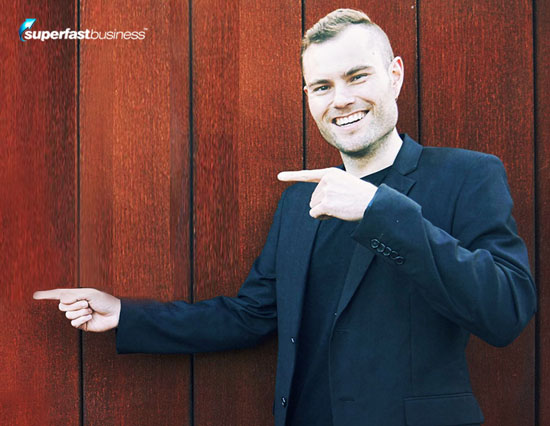
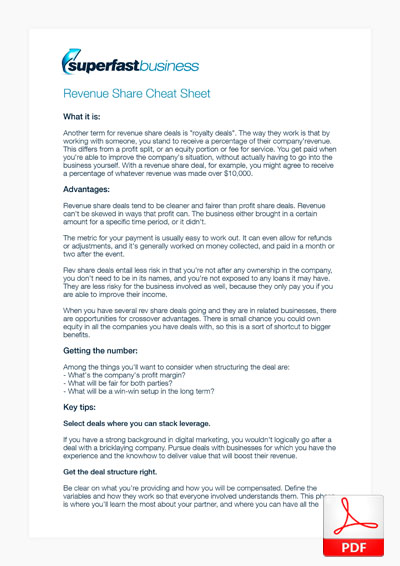




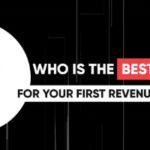





Great topic! We have a business we started in 2018 (ZEGOH) which follows this model of revenue share. I found this article extremely relevant and would love to chat to like minded guys about how it works in the US.
Revenue share model tick all the right boxes for us.